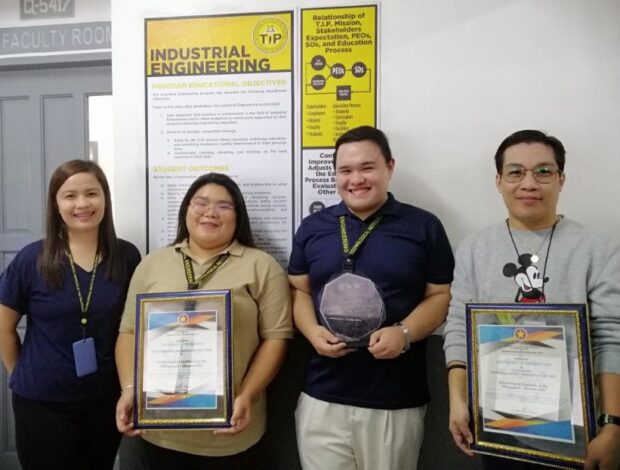No oven, no problem: Self-heating ‘HeatFlask’ wins at 2023 Annual Research Awards

MANILA, Philippines — Imagine reheating food and drinks without using an oven or any electrical heating device. Six innovative industrial engineering seniors from the Technological Institute of the Philippines (T.I.P.) in Quezon City have turned this vision into reality.
The students, led by Allen Serrano and Francine Daphne Carigma, developed a product called ‘HeatFlask’, which bagged the Outstanding Research of the Year and Best Commercialization Research awards at the 2023 Annual Research Awards (ARAW) hosted by the Polytechnic University of the Philippines (PUP).
The HeatFlask is not just any container. It’s a self-heating vessel crafted from stainless steel, designed specifically for those on-the-go moments where one needs to warm up canned food and drinks without access to a stove or microwave oven. Embedded inside the flask is a heat pack that initiates the reheating process.
The inspiration for the HeatFlask emerged from Carigma’s exposure to the food packaging industry. After witnessing a Filipino startup employ a similar reheating approach with boxes, she brought the idea to her team.
“We just thought of other alternative methods to heat up food products, and that is how we came up with ‘HeatFlask,’” Carigma mentioned. However, she acknowledges the product’s current limitation to canned goods, hinting at potential improvements in future designs.
Serrano revealed that the product stemmed from their feasibility study guided by their adviser, Engr. Jaypy Tenerife, who expressed his pride in his students’ achievement.
“The level of commitment” his team exhibited in constructing a persuasive business model that underscored their prototype’s unique selling proposition was pivotal to their success, Tenerife said. “It (HeatFlask) really showed a lot of promise as a business concept. I think that became our edge compared to the rest of the entries.”
Other vital contributors to the project were IE students Cyrdio Adrian Dela Peña, Irah Scott Naldoza, Jemuel Tan, and Neriel John Villamor.
But the HeatFlask wasn’t the only notable submission from T.I.P. A team of graduating T.I.P. Manila civil engineering students secured the first runner-up position in the Best Scientific Research category.
Their groundbreaking study, titled “Enhancing the Seismic Resilience of 42-Story Reinforced Concrete Structure with Fluid Viscous Damper System Using Modal Decomposition Method,” proposes a cost-effective solution for reinforcing high-rise buildings against earthquakes using energy-dissipating devices.
Fluid viscous dampers, which absorb vibrations or seismic waves, can prevent cracks and significant property damage. Their system, while potentially pricey depending on the construction scale, offers a more efficient solution to the ‘optimal damper placement’ problem many engineers grapple with.
Adviser Engr. Dustin Glenn Cuevas praised the team’s choice of the modal decomposition method, citing its efficiency and consistent performance.
Celebrating its 14th year, the ARAW awards took place on July 25, at the PUP campus in Santa Mesa, Manila, in collaboration with the Department of Science and Technology-Technology Application and Promotion Institute (DOST-TAPI).
The event highlighted the theme of “Resiliency and Sustainability in Times of Post-Pandemic: The Commitment of Serving the Country through Engineering, Science, and Technology.”
The awards garnered 97 submissions from schools nationwide, attesting to the country’s commitment to innovative solutions in challenging times.
This article was generated with the aid of artificial intelligence and reviewed by an editor.